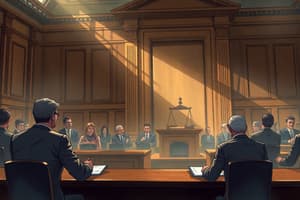Podcast
Questions and Answers
What is the purpose of the process attorneys use to select a jury?
What is the purpose of the process attorneys use to select a jury?
- To eliminate biased individuals from the jury pool (correct)
- To ensure they can control the jury's decision
- To choose jurors who are sympathetic to the defendant
- To create a jury that is familiar with the case
What constitutional right allows a defendant to refrain from testifying in their own defense?
What constitutional right allows a defendant to refrain from testifying in their own defense?
- 4th amendment
- 1st amendment
- 6th amendment
- 5th amendment (correct)
In which type of legal setting is a standard of 'proof beyond a reasonable doubt' applied?
In which type of legal setting is a standard of 'proof beyond a reasonable doubt' applied?
- Traffic court
- Juvenile court (correct)
- Administrative court
- Civil court
What is a plea bargain?
What is a plea bargain?
What type of witness provides personal observations and experiences during a trial?
What type of witness provides personal observations and experiences during a trial?
What is a key difference between indeterminate and determinate sentencing?
What is a key difference between indeterminate and determinate sentencing?
Which of the following describes mitigating circumstances?
Which of the following describes mitigating circumstances?
What does the 'hands-off doctrine' refer to in correctional law?
What does the 'hands-off doctrine' refer to in correctional law?
How do concurrence sentences differ from consecutive sentences?
How do concurrence sentences differ from consecutive sentences?
What is one of the reasons suggested for faster executions?
What is one of the reasons suggested for faster executions?
Flashcards
Indeterminate Sentencing
Indeterminate Sentencing
A sentencing model where the judge has flexibility to set a range of punishment based on the specific circumstances of the crime and the offender.
Aggravating Circumstances
Aggravating Circumstances
Factors that make a crime more serious, often resulting in a harsher sentence.
Mitigating Circumstances
Mitigating Circumstances
Factors that lessen the severity of a crime, potentially leading to a more lenient sentence.
Hands-Off Doctrine
Hands-Off Doctrine
Signup and view all the flashcards
Consecutive Sentences
Consecutive Sentences
Signup and view all the flashcards
Jury Selection
Jury Selection
Signup and view all the flashcards
Subpoena
Subpoena
Signup and view all the flashcards
Discovery
Discovery
Signup and view all the flashcards
Grand Jury
Grand Jury
Signup and view all the flashcards
Plea Bargain
Plea Bargain
Signup and view all the flashcards
Study Notes
Jury Selection and Trial Process
- Attorneys in a trial use jury selection to remove potentially biased or unsuitable jurors.
- Two types of challenges exist in jury selection.
- Hearsay evidence is excluded from trial unless specific conditions are met.
Sentencing and Corrections
- Sentencing can range from fines to community service to probation, jail, or capital punishment (death penalty).
- Alternative sanctions like rehabilitation also exist.
- Plea bargains are possible, where deals are worked out and presented to the judge.
- Defendants have the right to remain silent (5th Amendment).
- Prisons hold convicted criminals, while jails hold those awaiting trial, on bail, or flight risks.
- Prison terms are longer than jail terms.
- Juvenile courts focus on rehabilitation and the best interests of the juvenile.
- "Delinquency" is the term used to describe offenses by juveniles.
- The standard of proof is "proof beyond a reasonable doubt."
- Defendants can waive their right to a jury trial and choose plea options (guilty, not guilty, no contest).
Types of Witnesses and Evidence
- Character witnesses can set the stage for the type of person the defendant is(e.g., pastor, neighbor, teacher).
- Lay witnesses provide personal observations and experience.
- Expert witnesses testify based on their specialized knowledge.
- Defendants must appear in court when summoned, or face potential arrest and the consequences of non-compliance.
- All evidence, favorable or not, must be presented to the defense.
Sentencing Considerations and Judge's Role
- Sentencing can vary, including determinate (fixed) and indeterminate (variable) sentencing.
- Aggravating circumstances may increase a sentence, while mitigating circumstances decrease it.
- Judges play a crucial role in admitting or suppressing evidence.
- Concurrent sentences are served simultaneously, while consecutive sentences are served one after another.
Release from Prison and Correctional Concerns
- Good behavior and participation in prison programs can lead to release.
- The "hands-off doctrine" in corrections generally avoids interference in prison conditions.
Constitutional Rights and Privacy
- The 4th Amendment addresses privacy rights; however, the extent of these rights in different contexts (prisons, cars) is contextual.
Issues in the Justice System
- The speed of executions and related issues are sometimes debated.
- Certain political issues may influence decisions regarding correctional facilities (e.g. budget allocations)
Studying That Suits You
Use AI to generate personalized quizzes and flashcards to suit your learning preferences.




